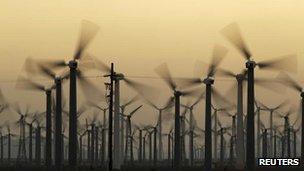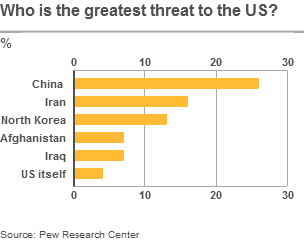China firm sues Obama over blocked US wind farm deal
- Published

The Chinese suit says the US president acted in an unlawful manner
A Chinese-owned firm in the US is suing President Barack Obama after he blocked a wind farm deal on national security grounds.
Ralls Corp, a private firm, acquired four wind farm projects near a US naval facility in Oregon earlier this year.
Mr Obama signed the order blocking the deal last week. The lawsuit alleges the US government overstepped its authority.
It is the first foreign investment to be blocked in the US for 22 years.
The block on the wind farms comes just weeks ahead of November's US presidential election.
China's state-run news agency Xinhua said "China-bashing" in order "to woo some blue-collar voters" was the reason for the decision.
The move forced Ralls Corp to divest its stake in the projects, which were located near restricted airspace used by the Naval Weapons Systems Training Facility.
Ralls Corp's complaint, filed on Monday, alleged that the US president had "acted in an unlawful and unauthorised manner".
The firm, owned by two Chinese nationals, said in its suit that Mr Obama failed to adhere to the law to treat Ralls Corp on equal terms. The court documents were made public on Tuesday.
Issuing the order last week, the White House said, external: "There is credible evidence that leads me to believe that Ralls Corporation... might take action that threatens to impair the national security of the United States."
'No threat'
However, the company said in its suit that Mr Obama had not produced evidence to support that.
The military has said it uses the Oregon base to test unmanned drones and other equipment for electronic warfare. The aircraft fly as low as 200ft (60m) at speeds of as much as 300mph (500km/h).
Ralls Corp is owned by two executives from Sany Group, China's largest engineering machine producer.
Responding to Mr Obama's decision last week, a representative of Sany Group told Chinese state media that the deal posed no threat to US security.
Zhou Qing, a company legal officer, told Xinhua on 29 September that Mr Obama's move was more likely a campaigning ploy or to protect the US wind farm industry.
China's trade advantage over the US has become a focus of Mr Obama's battle for re-election against Republican contender Mitt Romney.

In mid-September a new survey by the Pew Research Center, external showed that while most Americans saw US relations with China as "generally good", they also saw China as posing the greatest danger to the US.
The majority of those surveyed viewed China as a competitor of the US, rather than as an enemy or partner.
But at the same time, about 52% viewed China's rise as a world power to be a major threat to the US. At least 26% also saw China as posing the greatest danger to the US, over Iran and North Korea.
Last month, the Obama administration filed a complaint with the World Trade Organization against Chinese subsidies for its car industry.
- Published28 September 2012
- Published28 September 2012
- Published22 September 2012